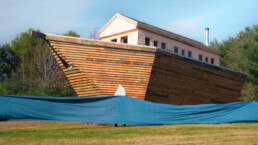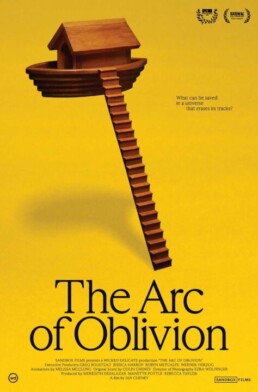‘The Arc of Oblivion’: A Kooky Mediation on Impermanence
Documentary director Ian Cheney's 'The Arc of Oblivion' playfully explores the human desire for keepsakes amidst an ever-evolving world.
Two of the documentary world’s most respected filmmakers, Werner Herzog and Kirsten Johnson, give their stamp of approval to Ian Cheney’s expansive and rhetorical film The Arc of Oblivion. Lending their astute insights to this cinematic meditation on mindfulness, The Arc of Oblivion playfully explores the human desire for keepsakes amidst an ever-evolving world. Confronted by a question with a myriad of possible answers, Ian Cheney encourages audiences to ponder what from this world is worth saving or, even more profoundly, “Are we insane to imagine that anything can last?”
Film is a tangible medium that has been around since the Lumière brothers presented the Cinématographe in December 1895. Images are captured and stored on rolls of film or hard drives, accessible when needed. Through the medium of film, we can experience cultures, periods, and places beyond our wildest imagination. The thought of this portal getting erased is terrifying, both from an enjoyment perspective and a historical one. As a filmmaker himself, Ian has always had a fear of losing his life’s work from one accidental deletion or natural disaster. In opposition to our need for preserving history, Planet Earth archives it by burying its dead, as seen in limestone layers, tree rings, and fossils. Is that the true order of how we should approach archiving– here one minute, and gone the next?
This train of thought sparks a chain of wild hypothetical theories about memories and the human desire to want to preserve a legacy. Ian draws comparisons, quite literally, to Noah from the Bible, asking what he would take with him on his arc if he existed in today’s modern times. Wanting to experience this scenario from a very method perspective, Ian enlists help from his parents and neighbor to build a 10ft arc in his backyard, using wood he excavates from the neighboring forest. This act of building a backyard arc gets Ian thinking about the fragility of memories, how to cope with their impermanence, and the theory that nothing ever “goes away”– rather, that energy is placed elsewhere.
The Arc of Oblivion has a kookiness to it that feels fresh and unexplored. The incorporation of video art, stop-motion animation, interviews with top subjects (including Johnson and Herzog), and timelapse sequences gives this unconventional thought experiment a sharp edge that is both fun and poignant. Werner Herzog is the film’s Executive Producer and he makes an appearance in the last 10 minutes, breaking the fourth wall in a way that feels exciting. He comments on the power of the word “Oblivion” in the film’s title, calling it a blessing because we would be miserable if we remembered everything. The human mind needs to be able to forget, he states. He even goes so far as to let us in on a little secret: Herzog discards all of the unused footage that doesn’t make it into his films. Never will you see an outtake, director’s cut, or extended scene. If it’s not in the film, it’s deleted from existence.
Acting as a philosophical springboard into the discussion of a desire for permanence, The Arc of Oblivion begs us to question, in the nicest of ways, if we are beautifully insane in our efforts to continue to preserve memories, despite the natural order of disregarding them. It’s a fascinating film that I hope remains in the public’s consciousness for a long, long time.
Morgan Rojas
Certified fresh. For disclosure purposes, Morgan currently runs PR at PRETTYBIRD and Ventureland.


